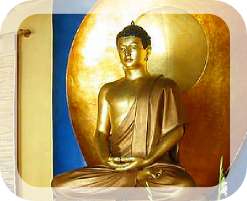The historical person of the Buddha was born as Siddartha Gautama in Lumbini (now in Southern Nepal) some 2500 years ago. He was the son of the patriarch of the Sakyan clan.
Despite a loving family, wealth and status, he felt troubled - what of old age, sickness and death? What use is wealth if you are going to die? What does it mean to love someone if you have to say goodbye? Why do we have to suffer?
Troubled by these questions Siddartha left his clan in order to lead the life of a homeless wanderer - a common spiritual practice in India at that time. After many years and trials, Siddartha succeeded in finding the answers to his questions. Through deep, calm meditation, insight arose in him. He saw directly into the nature of the human experience. He become an "awakened one" - a Buddha.
Buddhism is sometimes described as a religion, sometimes as a philosophy and sometimes as a psychological method. Buddhism includes aspects of all of these and more. Perhaps it is best described as "a path of liberation".
A common way to look at Buddhism is the 3 Fold Path:
1/ Ethics
A path of ethical training, based upon the principal of non-harm
to self and others. Not a list of commandments, but training principles
to help encourage skilful actions of body, speech and mind.
Leading an ethical life purifies the mind, allowing us to move beyond guilt and regret and into a "lighter way of being".
This provides an excellent foundation for meditation.
2/ Meditation
Buddhists practice meditation in order to calm the mind and body,
to integrate our scattered energies, thoughts and emotions.
Meditation allows us to be with ourselves more fully and therefore enter more deeply into our experience. This provides an opportunity for insights to arise.
3/ Wisdom
The gradual deepening of insights gained through combining study and meditation.
Wisdom in the Buddhist context refers particularly to the direct realisation of the nature of our experience, namely that things arise and fall upon conditions.
Because things are conditioned they are impermanent and don't exist seperately from the conditions that give rise to them. According to the teachings of Buddhism, our grasping after solid, lasting experience is the cause of our suffering.







